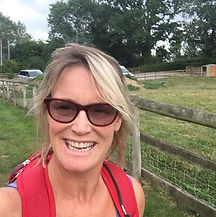
Specific Learning Difficulties
What does SpLD* stand for?
(Super Power Learning Department!)
*Specific Learning Difficulties
SpLD is the place learners go to discover the best way for them to learn, to discover strategies and resources that can help them in the classroom and to understand what a huge advantage learning differences can be. Their learning differences can become their super powers.
Specific learning difficulties means a learner has a difficulty with particular aspects of learning. The most common SpLD’s are dyslexia, dyscalculia, dyspraxia, dysgraphia and ADHD.
Who is in SpLD Team?
Meet The Team

Kirsty Leach
SpLD Teacher - Tuesday - Thursday from 9.30am - 2pm

Laura Macdonald
SpLD Teaching Assistant - Monday - Friday
How do learners get access to the SpLD Team at Gretton School?
Learners are referred to the SpLD team by class staff when other avenues of support have been trialled and cycles of Assess, Plan, Do, Review have been completed in class. These referrals are discussed weekly and where a learner needs specific intervention, this will be offered as part of the schools Universal, Targeted and Specialist offer. Cycles of SpLD support usually last for 6-8 weeks with regular reviews. Where a learner might need longer term support this would be offered and regularly reviewed with specific goals in mind. A learner would not automatically need targeted or specialist support from SpLD if they have a diagnosis of dyslexia for example but the class team around this learner would receive advice and resources from the team at a universal level initially. Once this has been trialled and the learner might still have difficulties, they might be supported as part of a small group or on a time limited 1:1 basis under the targeted and specialist level offer. As with multidisciplinary team referrals, consent would be sought from parents prior to specialist level work.
Examples of universal level recommendations from our SpLD team can be found below:
Multisensory teaching
A variety of teaching styles can really make a difference to retaining information and engagement. Can you use physical resources to help such as numicon, unifix, punctuation or word prompts, visual aids such as now and next, hands on teaching experiences, learning outside, using music or audio, videos and pictures and learning through action.
Processing
Be aware that the processing time can be much slower and so time is needed to absorb what has been asked of them. Support this by writing stepped instructions on the board or having prepared visuals that can spark the memory as to what has been asked of them, this can support independence and lessen the need for verbal prompts. Make instructions simple.
Reading for pleasure
Reading does not only need to be from a book but it does help to be a regular activity. There are many interesting ways to read, following a recipe, reading a comic or newspaper, following instructions, using plays to create a drama or even being read to can be very beneficial. We always recommend reading daily for our learners.
Spellings
One of the most common difficulties is spellings. Spellings require the physical action of writing or some other form to build up muscle memory and support retention. If possible, practicing spellings daily, in some form is vital for progress. They can be written in many different ways and do not have to be the usual written list. See this website for spelling practice ideas:
https://www.thoughtco.com/ways-to-practice-spelling-words-2086716
Vocabulary walls
Having a dedicated space where new words can be put up with a small illustration to support its definition allows a learner to independently use a resource that can help understanding and spellings.
Writing for purpose
To engage a reluctant learner try finding something they are passionate about and use it to engage learning. Can they write a letter to someone they admire? Can they write a list of instructions on how to play a game? Could they make invitations to a class party? Or can they write a review for a game or book they have accessed? Make writing meaningful and fun. Talk to the child about their struggles
Ask the learner if they know their strengths and weaknesses, can they tell you what learning is like for them? Would they like help? Resources? Equipment? It is so important young people have an understanding of the way they learn.
Differentiation
Can the instructions or task be simplified? Can they access the curriculum at a level that is easier for them to understand?
Aims and Goals for SpLD
The main aims for supporting SpLD needs at Gretton are:
-
A whole school approach that understands the learning differences and needs of the learners.
-
To encourage creative strategies into classroom practice that enable learners to work independently and inclusively with their peers.
-
For staff to undertake a metacognitive approach to learning when working and supporting children with their difficulties and to use the Assess Plan Do Review cycle.
Further Learning
There are lots of great websites that offer further knowledge, strategies and ideas when supporting learners with SpLD.
Made by Dyslexia is an organisation that offer an excellent training course for free for people that want to know a bit more about dyslexia, how to spot it and support it in the classroom.
https://www.madebydyslexia.org/
Inner Drive is a fabulous website for supporting metacognition around learners, to encourage and understand their own learning needs.
https://blog.innerdrive.co.uk/what-is-metacognition
The British Dyslexia Association is a hub of knowledge, advice and experience for learners with dyslexia
https://www.bdadyslexia.org.uk/
The Driver Youth Trust has a bank of resources specifically to understand and support literacy needs.
https://www.driveryouthtrust.com/
Oxford Owl is a place jam packed with information, resources and ideas. It's particularly useful for numicon and maths support. You can also access some assessment resources to help gain insight into current levels.
Twinkl has become an amazing resource especially for SpLD and SEN. It has specific dyslexia and dyscalculia resource packs.
https://www.twinkl.co.uk/resources/twinkl-boost/send-intervention-twinkl-boost
